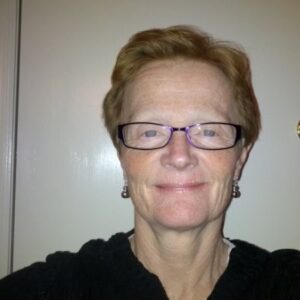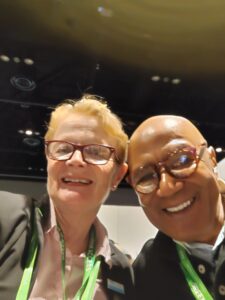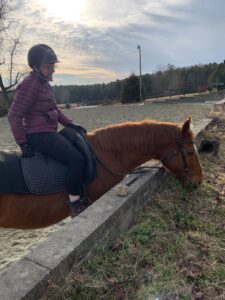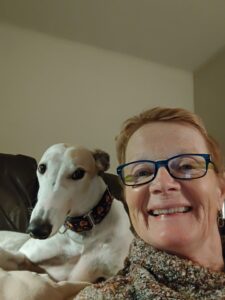
Name: Laurie Betts, Ph.D.
Current title: Research Associate
BCBP Lab: Charles Carter
Years affiliated with BCBP: Recently for one year, in the past I received my Ph.D. from this department in 1992, and was here during Mary Ellen Jones’ chairship.
What projects are you currently working on? I am working on an exciting collaborative project between Dr. Charlie Carter, Dr. Qi Zhang, and Dr. Abby Knight (Department of Chemistry) to investigate a possible way that prebiotic chemistry could have initiated “template-directed” (present-day mRNA is a template) peptide synthesis. This project was born out of Dr. Carter’s many years of thinking, experimenting and writing about the evolution of the genetic coding of peptides by minimal nucleic acids and minimal enzymes. Dr. Qi brings enthusiasm and youthful experience with nucleic acid structure and chemistry. I work with an enthusiastic graduate student, Alex Neary, in Dr. Qi’s lab as a close team. Dr. Knight’s group provides us with synthetic chemistry support and mass spectrometry expertise.

What was your background before coming to BCBP? I was trained as a macromolecular crystallographer and have solved many crystal structures of proteins and some nucleic acids. To me, there is nothing like the feeling of being the first person to see the electron density of a new protein structure with the intricate folding and fascinating chemistry that can be visualized. To me, seeing is believing. I also managed a UNC Core Facility; I was the first Facility Manager of what is now the Macromolecular X-ray Crystallography and Protein Expression Core Facility. In that role, I trained many students and post-docs how to collect crystallography data and use software that allowed them to solve structures. I loved working with students and being a part of their academic journey. I mostly worked in academic and government settings but also worked in the private sector.
What motivates you to do what you do? I really like learning new things about how Biology works, and I enjoy working with my hands and problem solving. I am an avid reader of for example Science and Nature and Cell and Cancer Research literature. I love basic research because to me it is about discovering how both Chemistry and Biology work in the living world. My current project is asking a fundamental question about evolution, whether we or others answer it (or if it is possible to answer it) we are learning.
What have been some of your best experiences with BCBP? I really liked working for Charlie Carter as a Ph.D. student; I learned protein crystallography and am still impressed with his passion for quantitative aspects of making discoveries. The current BCBP has changed a lot since I was a student. As a student I was fortunate to do a rotation in the lab of Aziz Sancar while his lab was developing the Nobel Prize winning research on DNA repair. I also met my husband, Dan, who was working as a post-doc with the Sancar lab. I worked as a technician for Mary Ellen Jones, the first female Department Chair. The current students are incredibly bright and the current faculty are mostly younger than me and so incredibly talented. I am impressed with our department’s commitment to Diversity, Equity, and Inclusion and to the LGBTQ community.
 Do you have any advice for current or future trainees at BCBP? Try to follow your heart and your nose as far as research and not just the money or the “prize”. If you care more about basic research, be prepared to have to work for funding, but try not to get discouraged. You don’t have to follow a straight path (I did not) to be productive and happy. Life will always throw you curve balls, but don’t ever feel alone in any personal struggle. Find people to talk to. Be teachable!!! I sometimes struggle with this and am constantly reminded of what I do not know. Be a good teacher (explain why you are doing things as well as how) and treat everyone how you would like to be treated.
Do you have any advice for current or future trainees at BCBP? Try to follow your heart and your nose as far as research and not just the money or the “prize”. If you care more about basic research, be prepared to have to work for funding, but try not to get discouraged. You don’t have to follow a straight path (I did not) to be productive and happy. Life will always throw you curve balls, but don’t ever feel alone in any personal struggle. Find people to talk to. Be teachable!!! I sometimes struggle with this and am constantly reminded of what I do not know. Be a good teacher (explain why you are doing things as well as how) and treat everyone how you would like to be treated.  FIND GOOD MENTORS who have what you want both in their work and how they treat people. Work as hard as you can but keep your sanity and work-life balance. Find things to do as a volunteer occasionally to keep your life perspective.
FIND GOOD MENTORS who have what you want both in their work and how they treat people. Work as hard as you can but keep your sanity and work-life balance. Find things to do as a volunteer occasionally to keep your life perspective.
What are your favorite activities outside of lab? I love riding horses and I love adopting former racing greyhounds. My husband and I volunteered for years at a greyhound adoption kennel twice a month. I did not have children, I am sure I would love seeing kids grow up and flourish. I was diagnosed with early stage esophagus cancer in 2018 and this was hard, but I also became involved with the UNC Lineberger Cancer Patient Advocates for Research. I have been an active cancer patient advocate for four years, and I actually love this work now more than my lab work, BUT because I am a scientist with experience in molecular and cellular biology, I can help my fellow advocates translate jargon and technical aspects of cancer research. We also work to make clinical trial literature more patient-friendly and I have attended national cancer conferences as a patient advocate. I encourage any basic researcher that is doing cancer research to get to know a few patients or patient advocates to see the other side of what they are studying. I am currently cancer-free, but I have a new-found respect and admiration for all health care workers.
